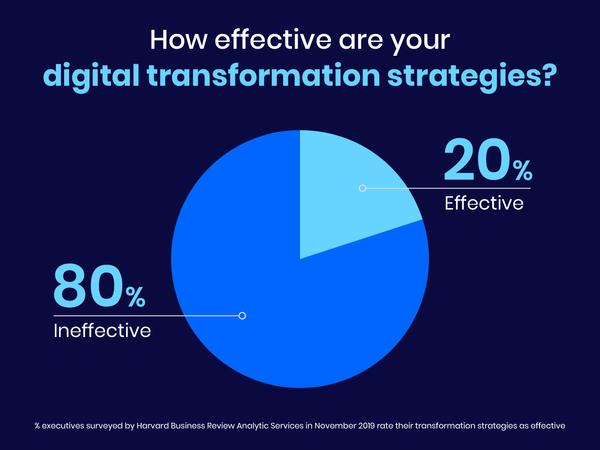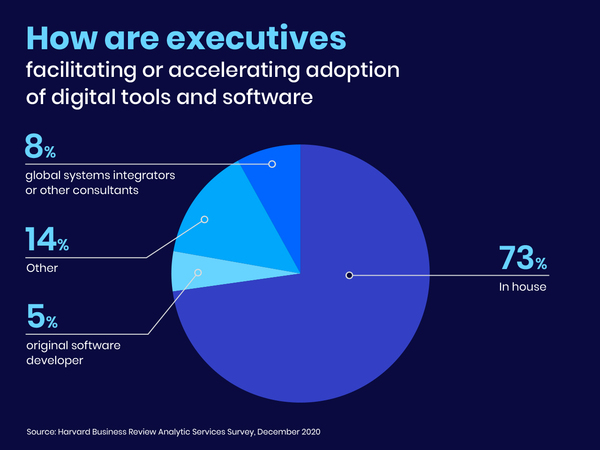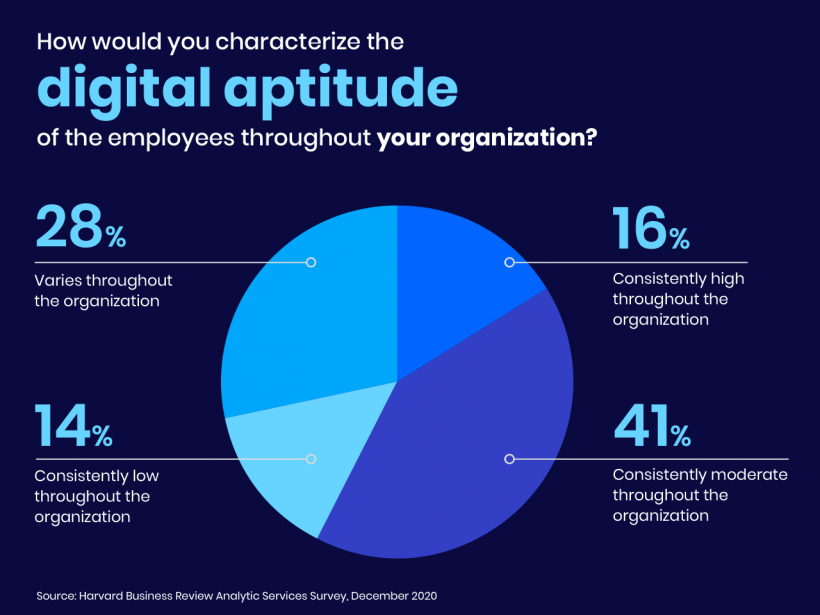
With the virtually inescapable need to get connected and get online, companies cannot rely any longer on analog systems. This is why digital transformation is already considered a necessity.
However, digital adoption is a complex endeavor. Businesses are aware of the importance of digitalization, so many have been moving forward with their digital adoption initiatives. However, only a few have been successful with these efforts. A recent survey by the Harvard Business Review Analytic Services provides telling figures as to why organizations need to pay more attention to their digital transformation plans.
Entitled "The State of Digital Adoption 2021," the study sponsored by digital adoption platform WalkMe reveals that not many organizations are succeeding with digital transformation or DX as referred to in the study. "Only 20% of executives surveyed rate their transformation strategies as effective," the study notes.

A 20 percent success rate is doubtlessly inadequate. Considering the costs companies need to endure to digitalize, finding ways to augment the ability to adopt new technologies is essential. This is where a new industry emerges. Companies are now turning to digital adoption experts to help them improve their digital transformation strategies and implementation.
The rise of the digital adoption ecosystem
To advance the benefits of digital adoption, 73 percent of executives surveyed in the study say they are establishing in-house centers of excellence. This appears to be a growing trend among organizations, as a new job category called "Digital Adoption Manager" has emerged. This new position focuses on generating quicker and greater returns on technology investments.

"The employees charged with promoting digital adoption are not only doing an important job, they may also be creating a new career pathway for themselves," the WalkMe-sponsored study notes.
A search on job sites would show various positions similar or related to the Digital Adoption Manager. These include Digital Adoption Lead, Senior Director for Digital Strategy, Digital Integration Lead, Global Digital Success Specialist, and Digital Preparedness Specialist.
Digital transformation is no longer just a one-off affair for organizations. This essential process for companies or organizations operating in the modern business landscape has already given rise to a cross-vertical industry ecosystem with its own set of vendors, specialist skill sets, resellers, and corporate programs and communities.
For a long time, many thought of digital transformation as a short-term process that is mainly about introducing employees to the use of computers, the internet, and other new technologies. However, with the constantly evolving nature of modern technology, an introductory course to new tech is no longer adequate.
Businesses that seek to take full advantage of the benefits of technology now have to establish a clear and cohesive plan of action that aligns their business goals, capabilities, processes, and platforms with new technologies that help boost productivity, efficiency, and security. Digital adoption is no longer just an end goal. It has become a continuing process in itself.
Hiring an instructor to conduct short-term digital adoption seminars and training for employees unlikely suffices as a DX (digital transformation) strategy. Conventional workplace learning programs alone cannot boost the success of digitization efforts. As the findings of the Harvard Business Review Analytic Services study infer, it would be necessary to make use of various elements in the digital adoption ecosystem to improve success rates.
Digital adoption platform
One of the most important elements in the new digital adoption ecosystem is the Digital Adoption Platform (DAP). A digital adoption platform is essentially software designed to assist employees, customers, and others to seamlessly adopt new technologies. It simplifies the user experience and ensures rapid learning and acclimatization to ensure successful digital transformation and raise ROI on tech investments.
Businesses that are trying to improve their employees' digital aptitude and the overall success of their digitalization strategies are turning to DAPs, which are designed to make it easier to harmonize people and new technologies. DAPs are heavily mentioned in the Harvard Business Review Analytic Services study.
"Such platforms (DAPs) typically show users how to operate across desktop, mobile, and web interfaces, all without leaving the screen they're working within. The most advanced DAPs feature digital experience analytics and leverage artificial intelligence to combine analytics and user experience data with situation-specific content that guides users, increases productivity, and enables organizations to realize higher returns on their digital assets," the study writes.
"We call our DAP our Swiss Army knife," enthuses Joseph Poyma, Digital Adoption Leader at Cross-Country Mortgage LLC. He explains that DAPs provide a level of versatility that allows organizations to enhance their digital transformation success without having to follow stringent protocols or processes that are unfamiliar to or incompatible with their organization.
"High-powered DAPs" provide features that do not only guide organizations with the steps or guidelines to improve DX outcomes. They also provide analytics that can facilitate the identification of employees or entire departments that may be having a hard time with the DX initiative. Analytics can also be used to pinpoint problems or specific software or tech that do not work well with employees.
ServiceNow's Digital Adoption Head Kristopher Clark welcomes the development of DAPs. "You can build the greatest system in the world, but getting someone to use it is a whole other battle....Winning that battle becomes a lot easier with a DAP," Clark explains.
Similarly, LogMeIn's Director of Global Training Tanya Seidel praises the DAP her company has been using as it helped their employees cope with the work routine changes brought about by the COVID-19 pandemic. "We found out that our finance teams were getting overwhelmed with custom requests from sales that they had to handle manually. We learned that if we put in a little tooltip reminding the sales team to check a particular box on their screen, finance wouldn't need to process their request manually," Seidel says.
DAPs have become an important part of the digital adoption ecosystem. They serve as the main products offered by the vendors and resellers mentioned earlier.
Can't companies do it on their own?
The State of Digital Adoption 2021 report presents a wealth of data that show how a vast majority of businesses already acknowledge the importance of digital transformation. The report says that "81 percent of business executives agree or strongly agree that the ability to rapidly adopt new technologies and embed them in their employees' everyday work is a competitive differentiator in their industry."
Additionally, the report shows that 82 percent of businesses have their typical employees interacting with four or more digital touchpoints on a daily basis. The inevitable use of new technologies presents difficulties to sizable percentages of employees. Around 42 percent of employees find it fairly difficult or very difficult to use multiple software applications to do cross-functional business processes.
Meanwhile, 34 percent say that they find it fairly difficult or very difficult to use enterprise resource planning systems. It also says that "80% of survey respondents say that it is important or very important for senior management to have a clear and complete overview of their organization's digital adoption progress via analytics."
However, the report does not conclude or suggest that companies are not capable of achieving successful digital transformation on their own. The digital adoption industry or ecosystem has emerged not to be compulsory elements for successful digitalization but to provide aid to struggling organizations.
A majority of the study's respondents, at 57 percent, say that their employees' digital aptitude is either consistently high or consistently moderate throughout the organization, with 28 percent saying that it varies. Only 14 percent report consistently low digital aptitude. The chances of success can certainly improve by tapping into the digital adoption ecosystem.

A necessary new sub-industry
Adopting a new technology into an organization's business processes is not as easy as providing a week-long seminar or orientation to employees. As the Harvard Business Review Analytics Services study shows, more than a majority of organizations fail to achieve their DX targets. They fully acknowledge they are in need of help in order to achieve their digital transformation goals - revamped workflows and employee mastery of adopted technologies. The goal, after all, is improved efficiency, not merely the actual adoption of a new tool.
The emergence of the digital adoption industry with its digital adoption managers, digital adoption platforms, DAP vendors and resellers, and other players in the DX ecosystem, has come to to fill the gap between needs and implementation. The demand for digital adoption solutions is real, and holds a sustainable impact on digital transformation endeavours.
* This is a contributed article and this content does not necessarily represent the views of techtimes.com









